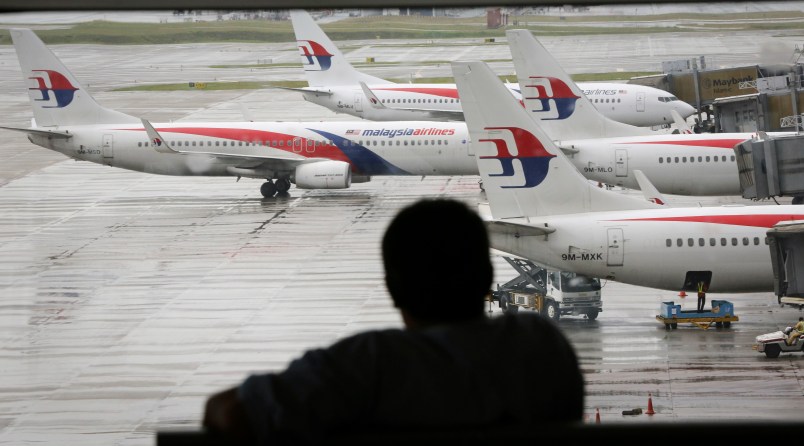The possibility that the civilian jetliner downed over war-torn eastern Ukraine with nearly 300 people onboard was hit by a missile could have profound consequences for the world’s airlines.
Airlines might have to be more vigilant about avoiding trouble spots, making flights longer and causing them to burn more costly fuel, an extra expense that is often passed onto passengers through higher fares. They may even be forced to reconsider many international routes.
In the hours after Thursday’s disaster involving a Malaysia Airlines jet, carriers around the globe began rerouting flights to avoid Ukraine. Some had been circumventing the country for weeks. Experts questioned the airline’s decision to fly near the fighting, even as Malaysia’s prime minister said that the plane’s route from Amsterdam to Kuala Lumpur was declared safe by international aviation authorities.
“I find it pretty remarkable that a civil airline company — if this aircraft was on the flight plan — that they are flight-planning over an area like that,” said Robert Francis, a former vice chairman of the National Transportation Safety Board.
Violence in Ukraine between government forces and pro-Russia rebels in the country’s east erupted a month after Russia annexed Ukraine’s Crimean Peninsula in March. Earlier this week, the rebels claimed responsibility for hitting a Ukrainian military jet with a portable surface-to-air missile; the pilot was able to land safely. And the government charged that a military transport plane was shot down by a missile fired from Russian territory.
In April, the U.S. Federal Aviation Administration cautioned airlines that Russia’s claim to the airspace over Ukraine’s Crimea could lead to conflicting air traffic control instructions. A few weeks later, the FAA issued a tougher warning, telling pilots not to fly over the area, and the U.N.’s International Civil Aviation Organization told governments to warn their airlines. Thursday’s crash, however, occurred outside the warning areas.
Thomas Routh, an aviation attorney in Chicago, said it would be unusual for an airline to ignore such warnings, but he said it’s up to airlines to decide whether a flight will be safe for crew and passengers.
“There are airlines flying through Afghanistan airspace every day,” Routh said.
John Cox, a former airline pilot and accident investigator, said despite the cautions, the airspace was not closed. The Malaysia Airlines crew filed a flight plan and “Russia and the Ukraine both accepted the airplane into their airspace,” he said.
Rerouting planes around war zones costs airlines money, as the planes burn more expensive jet fuel. Aviation expert Norman Shanks said many airlines continued to fly over Ukraine despite warnings because it offered a shorter route that saved money on fuel.
Greg Raiff, an aviation consultant in New Hampshire, said that if airlines must avoid flying over all the world’s hot spots, flight times would be extended, requiring extra fuel and pilots. That might make some routes uneconomical, forcing airlines to abandon them.
Airlines quickly changed some routes. Snapshots from flight-tracking services showed dense traffic to the west, light traffic to the east, but very few planes over Ukraine.
Emirates airlines said that one of its jets bound for Ukraine’s capital of Kiev turned around and returned to Dubai. The airline suspended all flights to Kiev indefinitely. It emphasized that flights to and from the U.S. and other European destinations don’t fly over the area where the Malaysia Airlines Boeing 777 crashed.
Germany’s Lufthansa immediately rerouted all overflights to avoid eastern Ukraine, although flights to Kiev and Odessa were not affected. Atlanta-based Delta Air Lines said that none of its flights operated over the portion of Ukraine covered by the FAA security advisory, but added that it would stop routing flights over any part of the country. India’s Ministry of Civil Aviation said Air India and Jet Airways would divert flights away from Ukraine.
Airlines don’t always risk flying over conflict areas.
Australia’s Qantas stopped flying over Ukraine several months ago and shifted its London-Dubai route 645 kilometers (400 miles) to the south. A spokeswoman declined to explain the change. Korean Air Line said it had rerouted cargo and passenger flights in early March amid the worsening situation over the Crimean peninsula.
Emirates stopped flying over parts of Syria as a civil war there expanded. Some airlines have curtailed service in Iraq, where violence has escalated between the government and a jihadist militant group. Some of the other places that the FAA also currently warns pilots to avoid parts of include Iran, Yemen, the Sinai peninsula and North Korea.
Last month, a gunman in Pakistan fired on a jetliner that was landing in Peshawar, part of the country’s volatile northwest region, killing a passenger and wounding two other people. Emirates suspended flights to Peshawar, and other carriers canceled some flights while they reviewed airport security. Two weeks before that, gunmen attacked the country’s busiest airport in Karachi.
___
Joan Lowy and Sagar Meghani in Washington and Frank Jordans in Berlin contributed to this report.
Copyright 2014 The Associated Press. All rights reserved. This material may not be published, broadcast, rewritten or redistributed.







Rerouting planes around war zones costs airlines money, as the planes burn more expensive jet fuel.
How much does having your 777 blown up with 298 dead, cost?
I bet it’s about money.
Oh, look, it’s about money.
let’s see, an extra 25 dollars on your ticket, or a horrible death. Hmmmm, tough call.
Not enough, apparently.
Their insurance will handle the lawsuits. Their (and everyone else’s) premiums will go up, and YOU and I will pay for it.
American “Christians” kneel at the throne of the amoral corporation.
And Jesus never stopped throwing up.